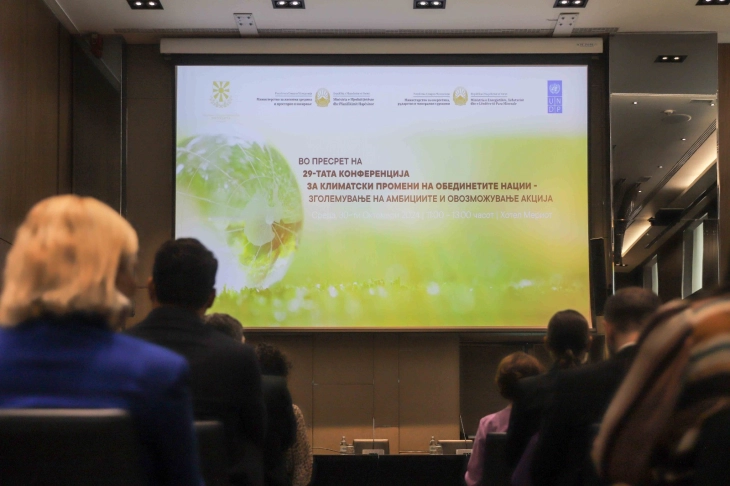Law on Climate Action and its implementation, a milestone for environmental protection and progress in the country
- Comprehensive strategies for combating climate change and consistent funding for specific actions to cut harmful greenhouse gas emissions are part of the expectations of the Macedonian delegation that will participate in the 2024 UN Climate Change Conference (UNFCCC COP29), set to take place from November 11 to 22 in Baku, Azerbaijan. COP29 serves as a pivotal platform for negotiating international climate policies.

Skopje, 30 October 2024 (MIA) - Comprehensive strategies for combating climate change and consistent funding for specific actions to cut harmful greenhouse gas emissions are part of the expectations of the Macedonian delegation that will participate in the 2024 UN Climate Change Conference (UNFCCC COP29), set to take place from November 11 to 22 in Baku, Azerbaijan. COP29 serves as a pivotal platform for negotiating international climate policies.
During the event organised by the United Nations Development Programme (UNDP), in cooperation with the Office of the President of the Republic of North Macedonia, the Ministry of Environment and Physical Planning, and the Ministry of Energy, Mining, and Mineral Resources, President Gordana Siljanovska-Davkova, who will lead the Macedonian delegation at the COP29 in Baku, highlighted the significance of the new Law on Climate Action and its effective implementation.
“Through the Law on Climate Action, we will effectively implement part of what may be the most difficult and expensive cluster in the negotiations for EU membership, which is the "Green Agenda and Sustainable Connectivity." This cluster encompasses the chapters on transport, energy, trans-European networks, and environment and climate change. Approximately 3.1 billion euros will be required solely for the transition to renewable energy sources and for enhancing energy efficiency,” she noted.

In this regard, she noted, COP29 will be crucial for securing funds for implementation.
“Thus, we need to present our strategies, plans, and activities and seek financial resources for their realization. Funding is crucial for implementation, particularly for the decarbonization of the energy sector,” President Siljanovska-Davkova stated.
Minister of Energy, Mining and Mineral Resources, Sanja Bozhinovska, stated that the majority of these funds are expected to be generated from private sector investments in renewable energy sources. However, she emphasizes that it is the responsibility of the government to establish the fundamental capacities needed to eliminate coal as a fuel and to build the necessary energy infrastructure.

“By recognizing these needs, we have launched the just energy transition investment platform,” Bozhinovska said.
The First Deputy Prime Minister and Minister of Environment and Physical Planning, Izet Mexhiti, affirmed that the expanded state delegation at COP 29 is evidence of the seriousness with which the climate change challenge is being addressed.

“For the first time, the delegation includes a representative from the Crisis Management Center and the director of the Hydro-Meteorological Bureau, underscoring the significance of these institutions in shaping policies to reduce the impacts of disasters and extreme weather conditions caused by climate change,” Mexhiti noted.
UNDP Resident Representative to North Macedonia, Armen Grigoryan, stated that UNDP will continue to provide strong support for climate action in the country in the coming period.
“Climate change is a challenge that cannot be tackled by countries independently. It knows no borders. That’s why an integrated and collaborative approach from all stakeholders is necessary. As it has in the past 20 years, the United Nations Development Programme will continue to provide robust support to the country through multiple projects focused on reducing greenhouse gas emissions, adapting to climate change, and enhancing resilience, which will strengthen the climate agenda in the country,” Grigoryan said.

He also presented a public opinion survey on climate change conducted by UNDP and the University of Oxford in 2024, which included 73,000 individuals from 77 countries worldwide, representing 87 percent of the global population. According to the survey, governments were identified as the institutions with the greatest influence in addressing climate change. In 89 percent of the countries included in the survey, 43 percent of people believe that governments have the greatest influence in addressing climate change compared to any other group. The majority of people, or four out of five globally, representing 80 percent, want their countries to strengthen their commitment to tackling the issue of climate change.
The Conference of the Parties on Climate Change (COP) began in 1995 with the first conference held in Berlin, following the adoption of the United Nations Framework Convention on Climate Change in 1994. Since then, COP has served as a key platform for negotiating international climate policies, advancing climate actions, and enhancing international cooperation to achieve a sustainable future.
Photo: MIA/ Siljanovska-Davkova’s Office







